Bayerische Motoren Werke Bundle
What Drives the Iconic BMW Brand?
Delve into the heart of Bayerische Motoren Werke (BMW) and discover the principles that steer this automotive giant. Uncover the Bayerische Motoren Werke SWOT Analysis and explore how its mission, vision, and core values shape its future in a rapidly evolving market.
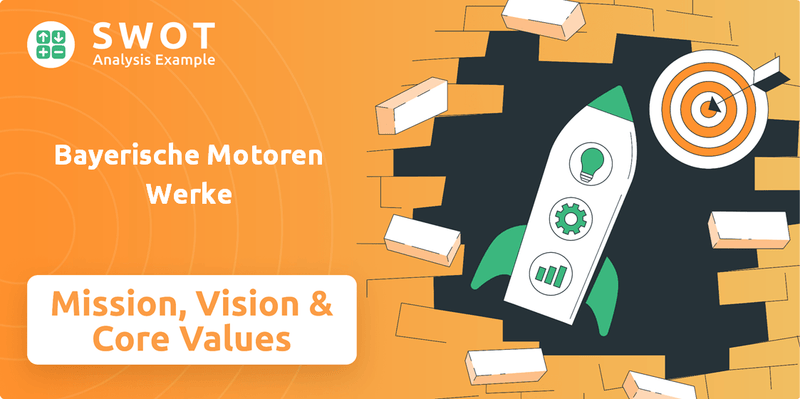
Understanding the BMW mission, BMW vision, and BMW core values is key to grasping the BMW company's enduring success. These elements, forming BMW's corporate philosophy, guide the BMW strategy and influence every aspect of the business, from product innovation to its commitment to sustainability. Examining these guiding principles provides valuable insights into BMW's long-term goals and its approach to innovation.
Key Takeaways
- BMW's mission focuses on emotional engagement, while its vision targets premium mobility leadership and sustainability.
- Core values (Responsibility, Appreciation, Transparency, Trust, Openness) are fundamental to BMW's operational and cultural framework.
- Electrification, digitalization, and sustainability are key strategic pillars aligned with BMW's mission and vision.
- BMW's purpose extends beyond vehicle production, encompassing the future of individual mobility.
Mission: What is Bayerische Motoren Werke Mission Statement?
BMW's mission is 'to move people with products that evoke emotions.'
Let's delve into the core of Bayerische Motoren Werke's (BMW) purpose. Understanding the Brief History of Bayerische Motoren Werke provides context for its enduring mission.
The BMW mission statement encapsulates two primary objectives: providing mobility solutions and fostering an emotional connection with customers. This dual focus distinguishes BMW in the automotive industry.
BMW primarily targets individuals seeking premium mobility experiences. Their product portfolio includes a range of premium automobiles and motorcycles, along with financial and mobility services. In 2023, BMW Group delivered approximately 2.55 million vehicles worldwide.
BMW's market scope is undeniably global, with production sites and sales networks spanning over 140 countries. This extensive reach underscores the company's commitment to serving a diverse international clientele. The company's global revenue in 2023 was approximately €155.5 billion.
The unique value proposition of BMW lies in the emotional response its products elicit, often encapsulated in the phrase 'Sheer Driving Pleasure.' This goes beyond mere transportation, offering an inspiring driving experience. This is a core element of the BMW strategy.
The mission is inherently customer-centric, aiming to satisfy both the functional need for mobility and the emotional desire for an engaging driving experience. This focus is crucial for understanding BMW's brand identity.
The mission implies a strong emphasis on innovation to create products that are both technologically advanced and emotionally appealing. The development of the NEUE KLASSE electric vehicles exemplifies this commitment. BMW invested approximately €7.5 billion in research and development in 2023.
The BMW mission statement guides the company's actions, from design philosophy to marketing campaigns, ensuring that every product and service aligns with its core purpose. Understanding BMW's guiding principles is key to grasping its long-term objectives.
Bayerische Motoren Werke SWOT Analysis
- Complete SWOT Breakdown
- Fully Customizable
- Editable in Excel & Word
- Professional Formatting
- Investor-Ready Format
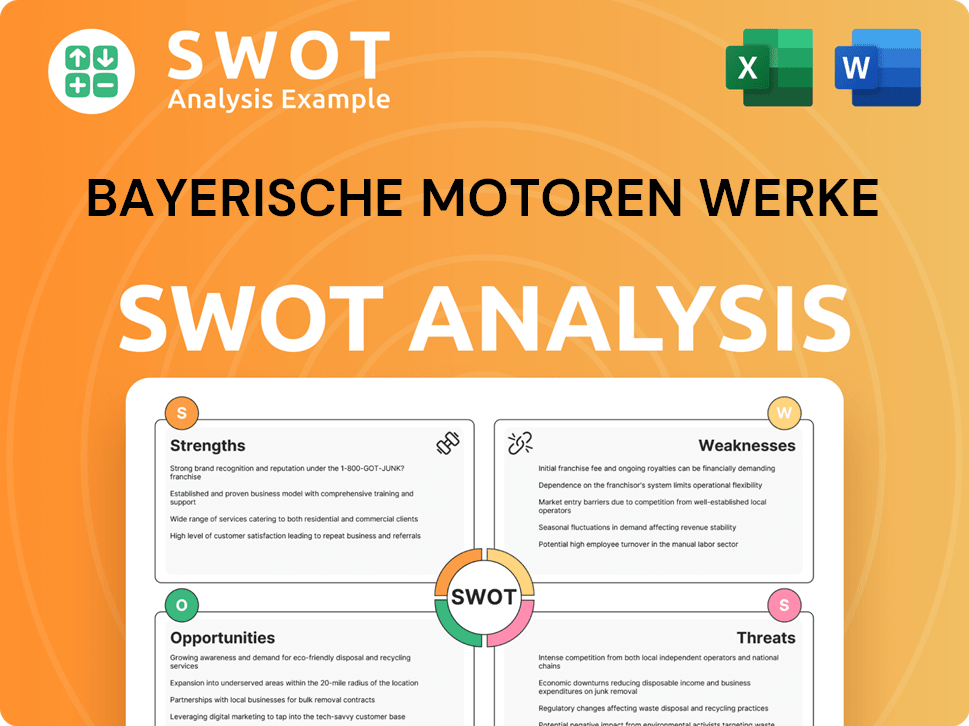
Vision: What is Bayerische Motoren Werke Vision Statement?
BMW's vision is 'to be the most successful, most sustainable premium manufacturer for individual mobility.'
Let's delve into the profound implications of the BMW vision statement. This ambitious declaration encapsulates the core aspirations of Bayerische Motoren Werke (BMW) and charts a course for the future of the automotive industry. Understanding this vision is crucial for investors, strategists, and anyone interested in the BMW company's long-term trajectory. The BMW mission, vision, and core values are all interconnected, forming the bedrock of its corporate identity and strategic direction.
The vision statement clearly positions BMW as a forward-thinking organization. It's not just about maintaining its current position; it's about leading the charge in the evolution of individual mobility. This forward-thinking approach is critical in a rapidly changing market, especially with the rise of electric vehicles and autonomous driving technologies.
Being "the most successful" implies more than just financial gains. It encompasses market share, brand reputation, customer satisfaction, and technological prowess. BMW aims to excel in all these areas, solidifying its position as a premium brand. This ambition drives innovation and continuous improvement across all facets of the business.
The emphasis on "most sustainable" is a key differentiator. BMW recognizes the growing importance of environmental responsibility. This commitment is reflected in its investments in electric vehicles, sustainable manufacturing processes, and the use of eco-friendly materials. This is a direct response to consumer demand and regulatory pressures worldwide.
The vision is explicitly focused on "premium manufacturer for individual mobility." This clarifies BMW's target market and product focus. It reinforces its commitment to the high-end segment of the automotive market, where it can leverage its brand strength and technological advantages. This focus allows BMW to maintain higher profit margins and invest heavily in R&D.
The vision is both realistic and aspirational. BMW is already a leading premium manufacturer, so the goal of being "most successful" is within reach. However, achieving "most sustainable" requires significant effort and innovation. This balance ensures that the vision inspires and motivates the company while remaining grounded in reality.
This vision statement guides BMW's strategic decisions. It informs investments in electric vehicle technology, digital services, and sustainable manufacturing practices. It also shapes the company's brand identity and its approach to customer engagement. The BMW strategy is directly aligned with this overarching vision.
BMW's commitment to its vision is evident in its financial performance and strategic initiatives. For example, in 2023, BMW Group delivered approximately 2.55 million vehicles to customers worldwide, a 6.4% increase year-over-year. Furthermore, the company has significantly invested in its electric vehicle portfolio, with sales of fully-electric vehicles increasing by 92.2% in 2023. The NEUE KLASSE platform, set to launch in 2025, represents a pivotal step towards achieving its sustainability goals. Understanding the BMW vision statement examples helps to understand how the company is structured and how it operates. To find out more about the BMW's guiding principles, you can visit the company's official website. This vision statement also influences the company's approach to innovation. The BMW's ethical standards are also aligned with the vision, ensuring that all business practices are conducted responsibly and sustainably. The BMW's commitment to sustainability is a key driver of its long-term success. For further insights into BMW's market position, you can explore the Target Market of Bayerische Motoren Werke.
Bayerische Motoren Werke PESTLE Analysis
- Covers All 6 PESTLE Categories
- No Research Needed – Save Hours of Work
- Built by Experts, Trusted by Consultants
- Instant Download, Ready to Use
- 100% Editable, Fully Customizable
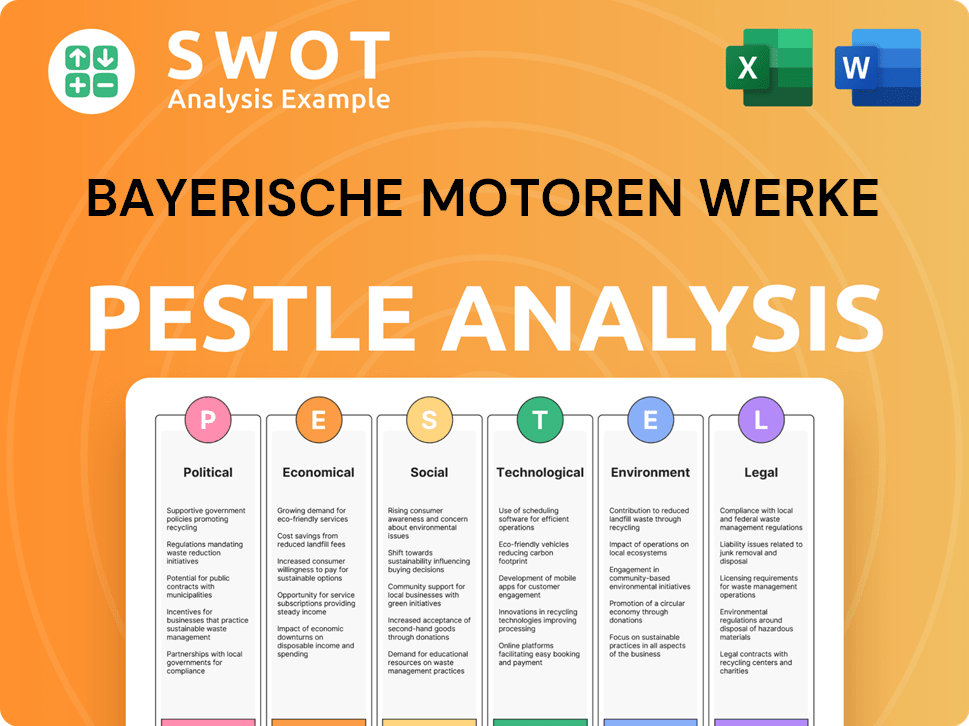
Values: What is Bayerische Motoren Werke Core Values Statement?
Understanding the core values of Bayerische Motoren Werke (BMW) is crucial to grasping its corporate identity and strategic direction. These values underpin BMW's operations, influencing its culture, decision-making processes, and interactions with stakeholders.
Responsibility at BMW encompasses taking ownership of actions, promoting corporate social responsibility, and upholding ethical standards throughout its operations. This includes a strong commitment to environmental sustainability, such as reducing CO2 emissions across its value chain and responsibly sourcing raw materials. For instance, BMW is investing heavily in electric vehicle production and sustainable materials, reflecting its commitment to its core value of responsibility, with plans to reduce its carbon footprint by 40% per vehicle by 2030.
Appreciation at BMW focuses on valuing employees and their contributions, fostering a positive work environment, and enhancing morale. This is evident in employee development programs and a culture that recognizes both individual and team successes. BMW's commitment to employee well-being and professional growth is a key aspect of its corporate culture, contributing to high employee satisfaction and retention rates.
Transparency at BMW involves open and honest communication, constructive feedback, and acting with integrity, which facilitates knowledge sharing and innovation within the company. This commitment to transparency is seen in its clear communication of its strategic objectives and performance metrics. BMW's dedication to open communication helps build trust with both employees and stakeholders.
Trust is about relying on each other and working together as a cohesive team, which is evident in collaborative projects and a supportive work environment. This value is crucial for fostering a strong team spirit and ensuring that all employees work towards the same goals. BMW's collaborative approach to innovation and its emphasis on teamwork are examples of this core value in action.
These five core values—Responsibility, Appreciation, Transparency, Trust, and Openness—form the bedrock of BMW's corporate culture. They are instrumental in shaping the company's brand identity and influencing its strategic decisions. Understanding these values provides valuable insight into the Revenue Streams & Business Model of Bayerische Motoren Werke, its approach to innovation, and its commitment to long-term sustainability. Next, we will explore how BMW's mission and vision influence the company's strategic decisions.
How Mission & Vision Influence Bayerische Motoren Werke Business?
The BMW mission and BMW vision are not just aspirational statements; they are the guiding stars that steer the BMW company's strategic decisions. These statements directly influence the company's business strategy, shaping its investments, product development, and overall direction.
BMW's mission and vision statements are the cornerstones of its strategic direction, particularly in the areas of electrification, digitalization, and sustainability. These elements are central to BMW's ongoing transformation strategy.
- Electrification: Significant investment in the NEUE KLASSE platform.
- Digitalization: Development of advanced digital features in vehicles.
- Sustainability: Commitment to a circular economy and reducing CO2 emissions.
The NEUE KLASSE platform represents a pivotal strategic decision, directly influenced by BMW's vision for the future. This platform is central to BMW's electric mobility strategy, ensuring a focus on innovative and sustainable solutions.
BMW's mission to evoke emotions and provide a premium individual mobility experience drives the development of advanced digital features. This focus ensures that BMW vehicles offer cutting-edge technology and a superior user experience.
BMW's commitment to a circular economy and reducing CO2 emissions across the supply chain is a direct result of its sustainability focus. This commitment is a key element of the BMW vision.
The increase in battery electric vehicle (BEV) sales demonstrates the tangible impact of BMW's strategic alignment with its mission and vision. In the first quarter of 2025, BMW Group delivered over 109,516 fully-electric vehicles, a 32.4% increase compared to the previous year.
BMW's target to reduce CO2 emissions by 40% per vehicle by 2030 across the entire value chain reflects its commitment to sustainability. This target underscores the company's dedication to environmental responsibility, a core aspect of its BMW core values.
Oliver Zipse, Chairman of the Board of Management of BMW AG, emphasizes the balance between near-term performance and long-term perspective. His focus on the NEUE KLASSE highlights the influence of the vision on long-term planning.
In essence, the BMW mission, BMW vision, and BMW's guiding principles are not merely words; they are the blueprints for the company's future. They drive strategic decisions, influence investments, and shape the BMW strategy across all facets of the business. To delve deeper into the foundational elements that guide BMW's operations, consider exploring the next chapter on the core improvements to the company's mission and vision. For more insights into the financial performance and ownership structure of the company, you can explore the information about Owners & Shareholders of Bayerische Motoren Werke.
Bayerische Motoren Werke Business Model Canvas
- Complete 9-Block Business Model Canvas
- Effortlessly Communicate Your Business Strategy
- Investor-Ready BMC Format
- 100% Editable and Customizable
- Clear and Structured Layout
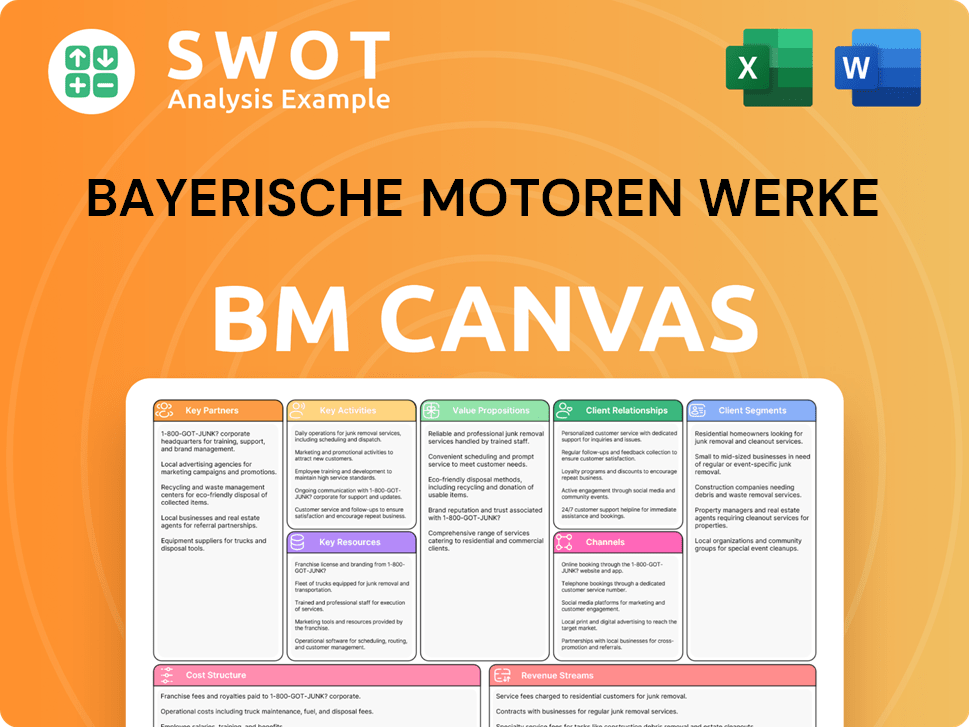
What Are Mission & Vision Improvements?
While the current BMW mission and BMW vision provide a solid foundation, strategic refinements can enhance their relevance in a rapidly evolving automotive landscape. These improvements aim to solidify BMW's position as a leader in future mobility and responsible corporate citizenship.
The BMW mission could be strengthened by explicitly incorporating a broader commitment to societal impact. This includes articulating BMW's role in promoting sustainable practices beyond product offerings, such as community engagement and social responsibility initiatives. In 2024, BMW invested €3.5 billion in research and development, a portion of which could be highlighted in a revised mission statement to demonstrate this commitment to a sustainable future.
Given the increasing digitalization of vehicles and the focus on autonomous driving, the BMW vision should explicitly include a commitment to ethical AI and data privacy. This would reflect BMW's dedication to responsible technological innovation and build consumer trust. The global autonomous vehicle market is projected to reach $62.49 billion by 2030, and emphasizing ethical considerations is crucial for capturing market share.
The BMW vision could be expanded to encompass its role in developing smart city infrastructure and integrated mobility solutions. This would align with the evolving nature of individual mobility and position BMW as a key player in the future of urban transportation. The smart city market is expected to reach $2.5 trillion by 2028, presenting significant opportunities for BMW.
Adapting the BMW mission and BMW vision to address emerging technologies like advanced battery recycling and evolving consumer behaviors around shared mobility could further solidify their position. Highlighting initiatives in these areas demonstrates a forward-thinking approach to sustainability and market adaptation. Read more about the Growth Strategy of Bayerische Motoren Werke to understand how BMW is evolving.
How Does Bayerische Motoren Werke Implement Corporate Strategy?
Implementing a company's mission, vision, and core values is crucial for translating strategic intent into tangible actions and outcomes. This chapter explores how Bayerische Motoren Werke (BMW) operationalizes its stated principles across its business practices.
The development and upcoming launch of the NEUE KLASSE platform exemplifies the practical application of the Mission, Vision & Core Values of Bayerische Motoren Werke. This platform, specifically designed for electric vehicles, underscores BMW's commitment to sustainability and digitalization, core elements of its vision.
- The NEUE KLASSE will feature a new generation of electric drivetrains and battery technology, significantly reducing emissions.
- Digitalization is a key focus, with advanced software and connectivity features enhancing the driving experience and operational efficiency.
- The platform incorporates circularity principles, aiming to minimize waste and maximize resource utilization throughout the vehicle's lifecycle.
Leadership plays a pivotal role in reinforcing the BMW mission and vision. Executives, including CEO Oliver Zipse, actively communicate the company's strategic direction and the importance of initiatives like the NEUE KLASSE to employees and stakeholders.
BMW communicates its mission, vision, and core values through various channels. These include annual reports, investor presentations, and corporate publications, ensuring transparency and alignment with stakeholders.
BMW's commitment to its core values is evident in its business practices. The company invests significantly in employee development and environmental sustainability, demonstrating its dedication to its stated principles.
BMW actively pursues sustainability through various initiatives. These include efforts to achieve zero landfill waste at its vehicle plants and the use of renewable electricity in production, supported by formal programs like its certified environmental management system.
Bayerische Motoren Werke Porter's Five Forces Analysis
- Covers All 5 Competitive Forces in Detail
- Structured for Consultants, Students, and Founders
- 100% Editable in Microsoft Word & Excel
- Instant Digital Download – Use Immediately
- Compatible with Mac & PC – Fully Unlocked
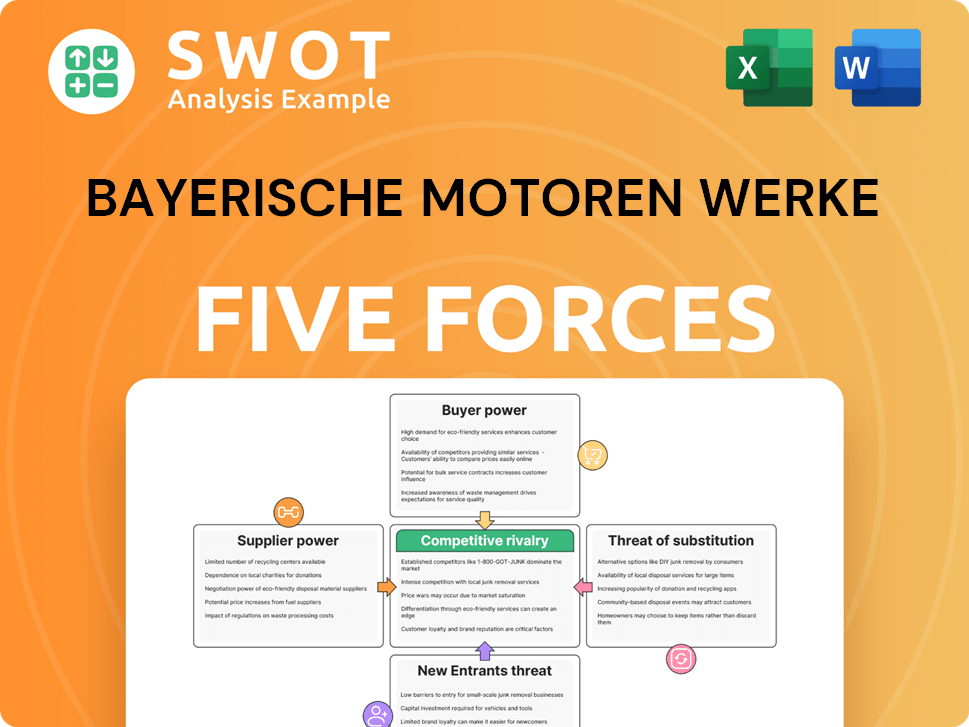
Related Blogs
- What are Mission Vision & Core Values of Bayerische Motoren Werke Company?
- What is Competitive Landscape of Bayerische Motoren Werke Company?
- What is Growth Strategy and Future Prospects of Bayerische Motoren Werke Company?
- How Does Bayerische Motoren Werke Company Work?
- What is Sales and Marketing Strategy of Bayerische Motoren Werke Company?
- Who Owns Bayerische Motoren Werke Company?
- What is Customer Demographics and Target Market of Bayerische Motoren Werke Company?
Disclaimer
All information, articles, and product details provided on this website are for general informational and educational purposes only. We do not claim any ownership over, nor do we intend to infringe upon, any trademarks, copyrights, logos, brand names, or other intellectual property mentioned or depicted on this site. Such intellectual property remains the property of its respective owners, and any references here are made solely for identification or informational purposes, without implying any affiliation, endorsement, or partnership.
We make no representations or warranties, express or implied, regarding the accuracy, completeness, or suitability of any content or products presented. Nothing on this website should be construed as legal, tax, investment, financial, medical, or other professional advice. In addition, no part of this site—including articles or product references—constitutes a solicitation, recommendation, endorsement, advertisement, or offer to buy or sell any securities, franchises, or other financial instruments, particularly in jurisdictions where such activity would be unlawful.
All content is of a general nature and may not address the specific circumstances of any individual or entity. It is not a substitute for professional advice or services. Any actions you take based on the information provided here are strictly at your own risk. You accept full responsibility for any decisions or outcomes arising from your use of this website and agree to release us from any liability in connection with your use of, or reliance upon, the content or products found herein.